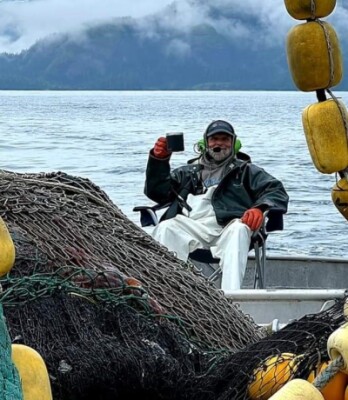As Lori French wrote for NF's February Dock Talk, fishermen have seemingly endless expressions for bad weather. The popularity of stories like "A Perfect Storm" would have us believe the biggest risks of fishing take place in bad weather. When in fact, the scariest prospect a fisherman can face is falling overboard. And if no one is around to see him fall, what are his chances of being rescued?
New York Times writer Paul Tough's retelling of Montauk, N.Y., fisherman John Aldridge's survival has caused more than a ripple of controversy in the fishing industry. The story itself of Aldridge's slip off the deck and subsequent (and miraculous) rescue is gripping and inspiring. But what exactly does it inspire? Fear? Hope? An impetus for change?
As former Coast Guardsman Mario Vittone wrote in his piece for gCaptain this week ("Trying very hard to die"), there seems to be a widespread acknowledgment of the dangers of fishing, yet very little effort to reduce the risk of those dangers. In fact, just a generation ago, fishermen widely accepted that if anything went wrong at sea, they would be lost. They didn't carry life rafts or EPIRBs or expect the Coast Guard to come to their rescue.
So in the grand scheme, the industry has come pretty far. That doesn't mean we don't have work to do. But changing a culture does not happen quickly. It happens slowly over generations. Fishermen are often born into the fishing industry. They fish because their fathers and grandfathers went fishing. That makes the culture of the industry not just pervasive from a community perspective but also nearly genetic. So even a small generational shift can require a lot of momentum.
The mistake Vittone and others make is comparing fishing to other maritime industries because they face similar risks by the virtue of being at sea. This is too simplistic a comparison to help solve the safety problem, and it makes fishermen easy to dismiss as cavalier and ignorant, essentially saying, they're the only ones who take these risks, so they must not care.
What makes the commercial fishing industry unique is that it is so varied. Commercial fishing boats have crews of 1 to 100 (and more). There are boat owners, fleet owners, greenhorns, deckhands; those who fish from the shore and those who fish hundreds of miles from shore; those who fish in warm waters year-round, and those who fish in cold water year-round. And, perhaps most importantly, you have those who fish with safety at the forefront and those who do not. But the dividing line is not necessarily education (though that does play a role). Economics is often a barrier, as well.
These variances make it nearly impossible to recommend a standard of safety to individual fishermen — except the use of a personal locator beacon and perhaps inflatable work vests. The one thing all boat-bound fishermen have in common is the low probability of surviving a fall overboard. If we really want to change the culture of safety in fishing, maybe we should find a way to subsidize or incentivize personal safety gear.
Many fishermen in this country are fishing right out straight, scraping to make ends meet. Those are the people most at risk for taking shortcuts and not investing in PLBs and flotation equipment. And honestly, can we blame them? Imagine asking a McDonald's cashier to invest $250 in protective gear on the slight chance that there's a grease fire in the kitchen behind them.
I don't make these comparisons to offer excuses. I make them to help people understand that resistance to change in the industry is not just cultural, it's economic as well. Many fishermen wonder what their future in fishing is literally from day to day. How can we expect them to make an investment in a murky future?
We ought to focus on clearing the air, rather than clouding the conversation with comparisons to other maritime industries. Most fishermen don't see themselves as a subsection of mariners. They see themselves as fishermen. If we want to continue the forward momentum of safety at sea, we have to make it easier for fishermen to understand the risks of not using safety gear and the benefits of investing in it.






